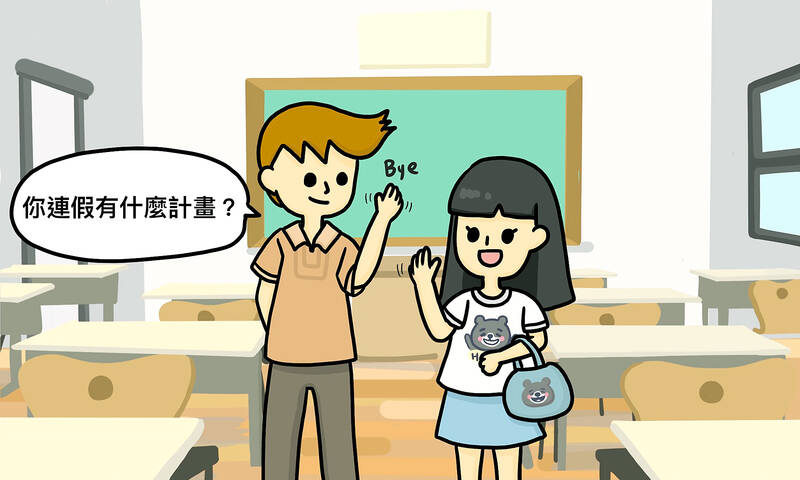對話 Dialogue
馬克:小實,下個月有幾天連假,你有沒有什麼計畫?
Make: Xiaoshi, xià ge yuè yǒu jǐ tiān liánjià, nǐ yǒu méiyǒu shénme jìhuà?

小實:沒有!連假時路上到處都是人,我不想出門。
Xiaoshi: Méiyǒu ye! Liánjià shí lùshàng dàochù dōu shì rén, wǒ bùxiǎng chūmén.
馬克:不出門的話,在家不會很無聊嗎?
Make: Bù chūmén de huà, zàijiā búhuì hěn wúliáo ma?
小實:我打算認真的追劇,哈哈!你呢?
Xiaoshi: Wǒ dǎsuàn rènzhēn de zhuī jù, haha! Nǐ ne?
馬克:我想趁這個機會到南部旅行,你覺得怎麼樣?
Make: Wǒ xiǎng chèn zhège jīhuì dào nánbù lǚxíng, nǐ juéde zěnmeyàng?
小實:開車的話肯定會塞車,建議你還是早點出門比較好。
Xiaoshi: Kāichē dehuà kěndìng huì sāichē, jiànyì nǐ háishì zǎodiǎn chūmén bǐjiào hǎo.
馬克:好,我會提早出門。
Make: Hǎo, wǒ huì tízǎo chūmén.
小實:期待你的分享,祝你旅途愉快喔!
Xiaoshi: Qídài nǐ de fēnxiǎng, zhù nǐ lǚtú yúkuài o!
馬克:謝謝,假期後見!
Make: Xièxie, jiàqí hòu jiàn!
翻譯 Translation
Mark: Xiaoshi, there will be a few days off next month, do you have any plans?
Xiaoshi: No. The roads will be packed during the long weekend. I don’t want to go out.
Mark: Wouldn’t it be boring at home if you don’t go out?
Xiaoshi: I plan to do some binge-watching, haha! And you?
Mark: I would like to take the opportunity to travel to the south. What do you think?
Xiaoshi: If you drive, you will almost certainly get stuck in traffic. I suggest you set off early.
Mark: OK, I’ll do that.
Xiaoshi: I’m looking forward to hearing all about it. I wish you a pleasant journey!
Mark: Thanks, and see you after the holidays!
單字片語 Vocabulary
1. 連假 (liánjià) long weekend
2. 計畫 (jìhuà) to plan
3. 無聊 (wúliáo) boring, bored
4. 認真 (rènzhēn) serious
5. 塞車 (sāichē) traffic jam
6. 建議 (jiànyì) to suggest
7. 期待 (qídài) to expect
8. 分享 (fēnxiǎng) to share, tell about
9. 旅途愉快 (lǚtú yúkuài) Have a nice trip
教材音檔 Audio Files
教材影片 Video Files:
https://www.instagram.com/celc.nou_tw/guide/_/17999106352646292/
實踐大學華語中心提供
By Shih Chien University Chinese Language Center: https://chineseusc.com/

US President Donald Trump has renewed his ambition to take control of Greenland for national security reasons and questioned whether Denmark has any legal right to the Arctic island. The debate has revived scrutiny of how Greenland became part of Denmark, its current self-rule and path to independence, and Washington’s military footprint. HOW DID DENMARK GET GREENLAND? Greenland was inhabited by Inuit peoples from Asia and North America intermittently from around 2,500 BC. Around 985 AD, Vikings led by Erik the Red settled in southern Greenland, farming and building churches. Around the same time, ancestors of today’s Inuit arrived, living as hunters

A: In its latest annual travel guide, Bloomberg recommended two restaurants in Taipei: Golden Pig barbeque from South Korea and two-Michelin-star restaurant A. B: Also, tourists should definitely try Taiwanese cuisine while they’re here. Mountain & Sea House, Shin Yeh Taiwanese Cuisine, and Fujin Tree Taiwanese Cuisine & Champagne are good options. A: For local snacks, Fu Hang Soy Milk, Fu-Ba-Wang Pigs’ Knuckles Restaurant, and Wang Ji Rice Dumplings are all very popular. B: And the gold medalists of the 2025 Taipei International Beef Noodle Festival — Yun Shui Kitchen, The Howard Plaza Hotel Taipei, and Come N’ Eat

A: Bloomberg just released its annual travel guide, titled “25 Best Places to Travel in 2026.” What were the best Asian destinations? B: There were actually six Asian hotspots: Taiwan’s Taipei, Malaysia’s Penang, Kazakhstan’s Almaty, Indonesia’s Rote Island, India’s Tiger Reserves, and Oman. A: With its mix of traditional food and modern cuisine, Taipei has become a rising food capital in Asia. B: As Bloomberg reported, “Taiwan is a place that bubbles up in culinary conversation because of its famed beverage, bubble tea, and its early adoption of modern night markets.” A: And Din Tai Fung has now

Owls have long fascinated people with their distinctive appearance and mysterious habits. These nocturnal birds possess large, round eyes and a flat facial disc. Their feathers come in shades of brown, gray, or white, helping them blend easily into the darkness. The most remarkable trait of owls is that they can turn their heads without damaging blood vessels. Contrary to popular belief, they can only rotate their heads up to 270 degrees, not 360 degrees. Owls have 14 cervical vertebrae, which is twice as many as humans. This special physical structure compensates for their inability to move their eyes within their